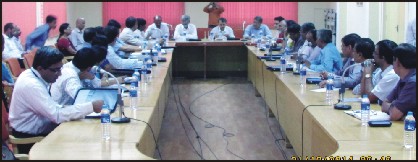Says Dr. Mohammad Aslam, Advisor, Dept. of Bio-technology

Mysuru :
“Explore networking technology to enhance quality silk production,” said Dr. Mohammad Aslam, Advisor, Department of Bio-technology (DBT), New Delhi.
He was speaking during the one-day Brain-storming Session on Mulberry and Silkworm sponsored by DBT and organised at the Central Sericultural Research and Training Institute, (CSR&TI), Mysuru, on Oct. 31.
He recalled the 20-year association of DBT with CSB in this area. He informed that during this period, DBT has organised a series of brainstorming sessions at different places across the country including North – Eastern States.
Speaking about the major objectives, he said application of biotechnology for increasing the productivity, improving the host plants, enhancing the silk quality, productivity utilisation and developing areas like silkworm seeds should be focused.
“The expert group had decided to have a separate session on silkworm and mulberry to develop the road map for the next 3-5 years and review the research outcome generated so far,” he informed and hoped to develop some transgenic network programmes in both on silkworm and mulberry.
He further added that DBT has taken up collaborative work with CSR&TI in this area. He appreciated Dr. Sivaprasad, Director, CSR&TI, Mysuru, for his initiative to organise this session.
Dr. L. Shashidhara of IISER, Pune, in his address, felt that research goals have already taken an in road in agriculture and now, it is the turn of sericulture to join and explore the possibilities of utilising it by working together with other institutes for the betterment of the industry.
Mentioning about the brisk technology activities of the world, he evinced keen interest in the collaborative studies in the field of sericulture.
Appreciating the phenomenal growth of silk industry, Dr. M. Uday Kumar, UAS, Bengaluru, spoke about few major constraints like irrigation and yield gap. He said that there is a need for genetic enhancement to improve the quality and the productivity. “The transgenic technology could be of immense use in this area,” he felt.
Dr. Sivaprasad, Dr. Mohd.Aslam, Prof. L. Shashidhara, Prof. Paramjit Khurana, UDSC, New Delhi, Prof. M. Udaya Kumar, UAS, Dr. S.K. Ashwath, CSR&TI, Mysuru, Dr. K.P. Arun Kumar, CDFD, Hyderabad, Dr. A.K. Awasthi, SBRL, Bengaluru, Dr. V. Satyavathi, CDFD, Hyderabad, Dr. P.J. Raju, APSSRDI, Hindupur, Dr. Nataraja Karaba, UAS, Bengaluru, Dr. Girishi Naik, CSR&TI, Mysuru, Dr. Jhansi Lakshmi, CSB, Dr. M.S. Sheshashayee, UAS, Bengaluru, Dr. B. Rita, CSB, Dr. T. Mogili, V.Kota, Dr. Rajashekar, CSR&TI, Mysuru were the invited speakers on the subject.
Various areas of networking and its applications in sericulture were discussed and the vital areas to be focused for the improvement of silk industry were earmarked in the session.
Eminent scientists from DBT, New Delhi, IISER Pune, CCMB, Hyderabad, CDFD, Hyderabad, UAS, Bengaluru and several Universities, R&D Institutes of Central Silk Board and State Governments participated.
Dr. Thippeswamy, Dr. Girish Naik and Dr. Ashwath co-coordinated the programme.
source: http://www.starofmysore.com / Star of Mysore / Home> General News / Tuesday, November 04th, 2014








